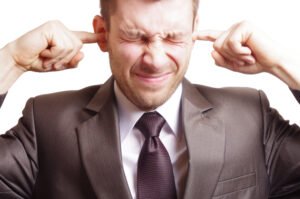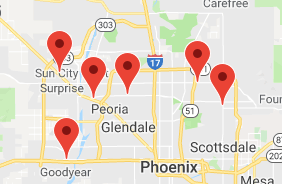Updated for 2024

Normally, ears are able to take fairly good care of themselves. They should feel comfortable and free. You should be able to hear sounds clearly, from birds chirping to your favorite music. Most of us take great hearing for granted until we wake up thinking, “Why do my ears feel clogged today?”
When an ear feels clogged and muffled, the symptoms tell you something is wrong right away:
- Earache
- Feeling of pressure
- Ringing in the ears
- Dizziness
- Trouble hearing
- Itchiness
It’s frustrating when your ear feels full, and having ear pain makes it hard to enjoy the things you had planned for the day. What causes clogged ear symptoms? This helpful guide can show you what to do and what to avoid.
Common Causes of Ears Feeling Clogged
1. Impacted Earwax
A common cause of clogged ear problems is earwax that has built up and hardened inside your ear canal. This happens to some people more than others.
Ordinarily, your ears take good care of themselves, automatically getting rid of earwax. The old wax should fall out on its own, usually when you shower. What goes wrong?
- Excess earwax: Some people tend to produce too much earwax, so the ear canal can fill up faster than old wax is removed.
- Low-quality earplugs: Other people use devices that trap earwax and compress it, such as low-quality earplugs or earbuds.
- Cotton swabs and fingers: A big reason for impacted earwax is when a person has the habit of sticking fingers or cotton swabs into their ears. Never do this.
Earwax is a healthy part of protecting your ears. It lubricates the delicate skin inside the ear canal. It’s sticky so it can trap dirt, debris, and other contaminants that would irritate the ear otherwise.
2. Sinus Problems
Your sinus cavities are located close to the ear canal. If you frequently have sinus infections or inflammation issues, it can indirectly cause clogged ears. Swollen, tender sinuses push on the ear canal, close the Eustachian tube, and put pressure on the eardrum. Your ear feels clogged and muffled.
Some people experience sinus congestion because of allergies. This type of swelling is irritating but not usually something to worry about. Your clogged ear symptoms should go away automatically as the sinus allergies start to fade.
On the other hand, sinus infections are serious business because of the danger of damage to the eardrum. They also tend to be very painful. If you notice a sudden change in hearing from sinus problems, schedule an appointment with a nose, throat, and ear specialist in Scottsdale, Phoenix, Glendale, and Sun City. A doctor can also help if swelling or pain makes it hard for you to sleep, chew, or work normally.
3. Fluid Trapped in the Ear
When fluid gets trapped in your Eustachian tube — a narrow passage between the middle ear and the throat — it causes a feeling of fullness, pressure, and sometimes pain. Normally, this tube helps drain mucus and other fluids, but it can get blocked, with fluid building up behind the eardrum.
One reason fluid can get trapped inside the ear is that water gets inside your ear when you shower or go swimming. Normally, this type of clogged ear will go away on its own. You can try tilting your head to encourage the liquid to drain more quickly.
A clogged Eustachian tube is more serious and more painful when it happens because of an ear infection. Ears can get infected by viruses, bacteria, or fungi (also known as swimmers’ ears). Always visit an ear doctor for help if you notice a fever, sharp pain, or fluid drainage that lasts longer than a day.
4. COVID-19
Cold and flu viruses are capable of causing sinus congestion and clogged ear problems. You can just add “my ear feels clogged and ringing” to the long list of virus symptoms alongside sore throat, coughing, and other bothersome issues. Many people wait a few days to see if the congestion clears up on its own, but again, visit your doctor if you experience intense pain or fluid discharge.
What about COVID-19? So far, a clogged ear isn’t one of the main symptoms of COVID-19, but it could happen. Some variants of COVID-19 have symptoms closer to a common cold, which may trigger ear swelling and earaches.
There are only a few rare cases where COVID-19 resulted in strange hearing loss suddenly. At any rate, if you suspect you have a cold or flu, there’s nothing wrong with seeing a doctor to rule out other ear problems.
Treatments for When You Get Your Ear Clogged
What can you do to take care of a clogged ear? Here are a few things you can try yourself:
- The Valsalva maneuver: You’ve probably used this technique before without knowing its name. To try the Valsalva maneuver, breathe deeply, pinch your nose shut and close your mouth. Now try exhaling through your nose, blowing gently to open the Eustachian tube. Don’t put too much pressure on your eardrum.
- Over-the-counter medication: If your clogged ear is caused by allergies, sinus congestion, or a cold, try taking an OTC decongestant or allergy medicine. This may alleviate the pressure and pain you have. Make sure to follow label directions.
- Ear drops: Special ear drops specifically designed for earwax blockages can help soften hardened earwax. Follow the directions on the label. Usually, this involves placing a few drops inside the ear canal and tilting your head for a few moments to let them sink in. This may help impacted earwax to fall out on its own.
If the above tips don’t work, it’s best to let an ear doctor treat clogged ear problems. If you are prone to frequent earwax buildup, your doctor may want to show you additional techniques you can follow at home to help with your ears feeling clogged.
Get Help With Clogged Ears in Scottsdale, Phoenix, Glendale, and Sun City
Taking good care of your ears is important, and you should get the right treatment when you have a clogged ear. We at MetroHearing, specialize in audiology — and will help you treat hearing issues. Clogged ears often are more of a nuisance than a long-term issue, however you should visit an audiologist if any symptoms you’re experiencing make you nervous. You don’t want ear infections to cause further ear damage down the road. If you notice persistent tinnitus or experience some hearing loss, you should contact a hearing health professional at MetroHearing in Scottsdale, Phoenix, Glendale, and Sun City.
Image Source: Pixel-Shot / Shutterstock

